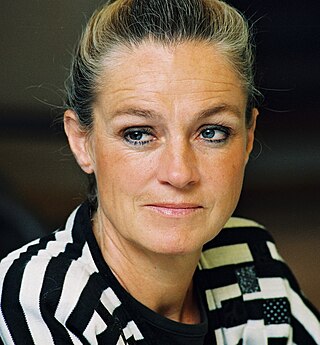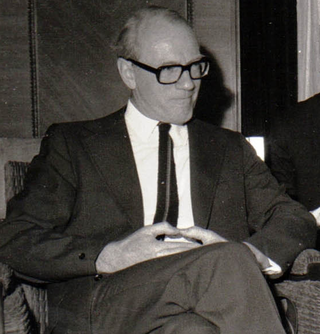Related Research Articles

Poul Holmskov Schlüter was a Danish politician who served as Prime Minister of Denmark from 1982 to 1993. He was the first member of the Conservative People's Party to become Prime Minister,as well as the first conservative to hold the office since 1901. Schlüter was a member of the Folketing for the Conservative People's Party from 1964 to 1994. He was also Chairman of the Conservative People's Party from 1974 to 1977 and from 1981 to 1993.

Anker Henrik Jørgensen was a Danish politician who served at various times as prime minister and foreign minister of Denmark. Between 1972 and 1982 he led five cabinets as prime minister. Jørgensen was president of the Nordic Council in 1986 and 1991.

Ritt Bjerregaard was a Danish politician who was a member of the Danish Social Democrats,and was Lord Mayor of Copenhagen from 1 January 2006 to 2010.

Svend Gunnarsen Auken was a Danish politician. He represented the Social Democrats as a member of the Danish parliament (Folketinget) from 1971 until his death.

Poul Nielson is a Danish politician from the Social Democrats who has held the posts as Energy Minister and Minister of Development Cooperation,and served as European Commissioner for Development and Humanitarian Aid from 1999 until 2004.

Marienborg,a mid 18th-century country house perched on a small hilltop on the northern shore of Bagsværd Lake,Lyngby-Taarbæk Municipality,15 kilometres (9.3 mi) north of downtown Copenhagen,has served as the official residence of Denmark's prime minister since 1962. It is frequently used for governmental conferences,summits and other official purposes,including the prime minister's new year speech. Unlike the residences of many other heads of government and state,Marienborg does not serve as the government headquarters or contain the office of the prime minister. The Prime Minister's Office is instead located in Christiansborg on Slotsholmen in downtown Copenhagen. Marienborg was listed on the Danish registry of protected buildings and places in 1964.

Minister for Development Cooperation of Denmark was a Danish Government ministerial office. The office was introduced with the Cabinet of Poul Nyrup Rasmussen I on 25 January 1993.

The Prime Minister's Office is the cabinet ministry of the Kingdom of Denmark,tasked with assisting the Prime Minister of Denmark,as well as the Cabinet of Denmark and Council of State.

Knud Børge Andersen was a Danish politician,who served as Danish Minister of Education and Minister of Foreign Affairs,and held international offices.
Knud Ludvig Johannes Hertling was a Greenlandic-Danish politician from the Social Democrats. He served as Minister for Greenland from 1971 to 1973 under prime ministers Jens Otto Krag and Anker Jørgensen.

Nick Hækkerup is a Danish writer and politician of Social Democrats who has been serving as the Minister of Justice in the Frederiksen Cabinet from 2019 to 2022. He previously served as Minister of Defence,and Minister of Health.

The Minister of European Affairs was a ministerial title related to European Affairs. Since Bertel Haarder,the position has been a temporary post related to the planning and execution of Denmark's Presidency of the Council of the European Union.

The Minister for Economic Affairs is a Danish ministerial title,following a split from the Minister for Finance. The position was at a point joined with the Minister of Business Affairs.
Anders Ejnar Andersen (1912–2006) was a Danish politician who was a member of Venstre and held various government posts,including minister finance and minister of economic affairs in the 1970s and 1980s.
Orla Reinhardt Møller was a Danish priest and politician who served in different cabinet posts in the 1960s and 1970s. He was a member of the Social Democrats and of the Parliament between 1964 and 1977.

The Frederiksen II Cabinet is the current Government of Denmark,which took office on 15 December 2022. It succeeded the Frederiksen I Cabinet following the 2022 general election.

Krag's first cabinet was the government of Denmark from 3 September 1962 to 26 September 1964,headed by Jens Otto Krag as prime minister,and succeeded Kampmann's second cabinet when he stepped down due to poor health. The cabinet consisted of the Social Democrats and Social Liberal Party.
Poul Sørensen was a Danish politician who headed the parliamentary group of the Conservative People's Party from 1958 to 1969. He was a follower of the pragmatic social conservatism. He also served as the ministry of labor and social affairs between 1950 and 1953 and minister of interior between 1968 and 1969.

The Minister for Housing is a Danish minister.
References
- 1 2 3 "Knud Heinesen". Den Store Danske Encyklopædi (in Danish). Archived from the original on 27 April 2021. Retrieved 2 January 2022.
- 1 2 3 4 5 6 "Heinesen, Knud" (in Danish). Leksikon. Archived from the original on 14 April 2021. Retrieved 2 January 2022.
- ↑ David Rehling (23 November 2006). "Knuds kraftfulde krønike". Information . Archived from the original on 2 January 2022. Retrieved 2 January 2022.
- 1 2 3 4 5 6 7 8 9 10 11 "Knud Heinesen, (f. 1932)" (in Danish). Danmarks Historien. Archived from the original on 2 January 2022. Retrieved 2 January 2022.
- ↑ "Regjeringen Hilmar Baunsgaard". statsministeriet.dk (in Danish). Retrieved 27 April 2024.
- ↑ Ove Korsgaard; Susanne Wiborg (2006). "Grundtvig—the Key to Danish Education?". Scandinavian Journal of Educational Research . 50 (3): 371. doi:10.1080/00313830600743381.
- ↑ "Regjeringen Jens Otto Krag III". statsministeriet.dk (in Danish). Retrieved 27 April 2024.
- ↑ "Regjeringen Anker Jørgensen I". statsministeriet.dk (in Danish). Retrieved 27 April 2024.
- 1 2 "Regjeringen Poul Hartling". statsministeriet.dk (in Danish). Retrieved 27 April 2024.
- ↑ "Regjeringen Anker Jørgensen II". statsministeriet.dk (in Danish). Retrieved 27 April 2024.
- ↑ "Regjeringen Anker Jørgensen III". statsministeriet.dk (in Danish). Retrieved 27 April 2024.
- ↑ "Regjeringen Anker Jørgensen IV". statsministeriet.dk (in Danish). Retrieved 27 April 2024.
- 1 2 "Knud Heinesen (S)" (in Danish). Folketinget. Retrieved 27 April 2024.
- ↑ "Regjeringen Anker Jørgensen V". statsministeriet.dk (in Danish). Retrieved 27 April 2024.
- ↑ "Regjeringen Poul Schlüter I". statsministeriet.dk (in Danish). Retrieved 27 April 2024.